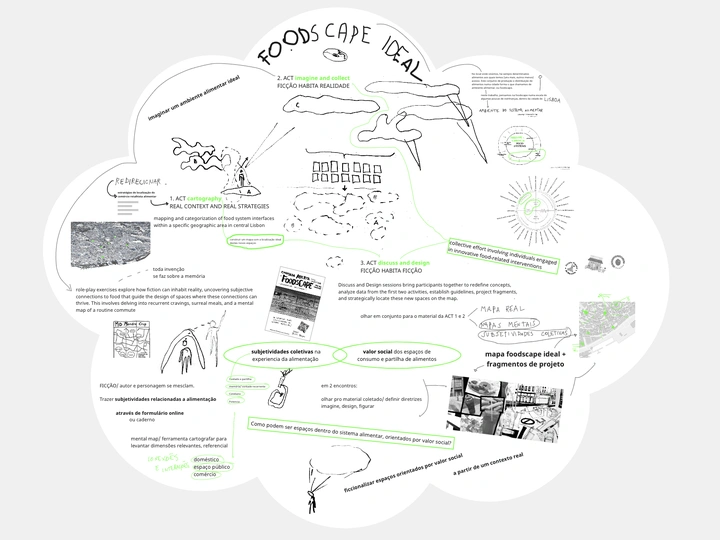Ideal foodscape

Julia Ribeiro is the artistic director behind Ideal Foodscape. With a decade-long career as an architect specializing in food retail projects in Brazil, she brings a comprehensive understanding of the sector to her current pursuits. Transitioning to Lisbon in 2022 to pursue arts studies at Ar.Co, Julia expanded her focus to encompass artistic and social projects related to food.
Actively engaged with organizations like Cozinha Popular da Mouraria- a community kitchen, Alimentar Cidades Sustentáveis Associação, and Rizoma - a cooperative grocery. Julia's work is deeply rooted in the intersection of art, architecture, and social change. Her multidisciplinary approach draws from her extensive experience, allowing her to challenge conventional structures and envision alternative narratives within the food system.
Julia's artistic practice utilizes fiction as a tool for expanding reality and questioning established norms. Through mediums such as drawing, diagrams, and videos, she explores possibilities for creating spaces within the food system driven by social value. Her work aims to subvert traditional retail techniques, transforming them into platforms for reflection, critical analysis, and artistic experimentation.
The Ideal Foodscape is an art project based in Lisbon that starts with a speculative research endeavor to envision spaces within the food system driven by social value. Employing fiction as a means to broaden perspectives and challenge rigid frameworks, the project is a collective effort involving individuals engaged in innovative food-related interventions, including Cozinha Popular da Mouraria (a community kitchen), Fruta Feia (a Portuguese cooperative combating food waste), and Rizoma (a cooperative grocery).
Departing from the real context, which includes cartography supermarkets, markets, groceries and sustainable initiatives. The project integrates real strategies from traditional retail, plus superpowers.
The project unfolds through three main activities.
Firstly, there's the mapping and categorization of food system interfaces within a specific geographic area in central Lisbon.
Secondly, role-play exercises explore how fiction can inhabit reality, uncovering subjective connections to food that guide the design of spaces where these connections can thrive. This involves delving into recurrent cravings, surreal meals, and mind mapping.
Lastly, the "Discuss and Design" sessions bring participants together to redefine concepts, analyze data from the first two activities, establish guidelines, project fragments, and strategically locate these new spaces on the map.